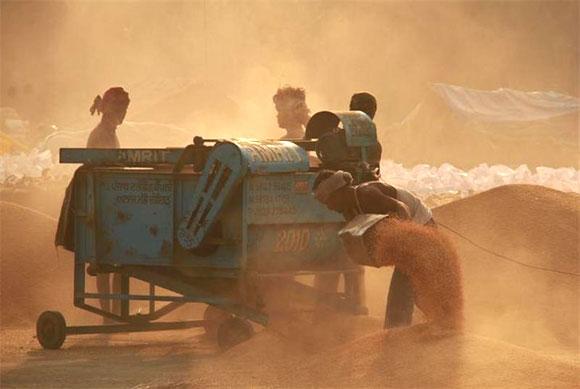
With hardly anything positive to flaunt before the electorate while seeking a third consecutive term at the Centre, Sonia Gandhi’s Congress is desperately hoping that the food security law will help it win the support of the people much like the national rural employment guarantee or the right to information acts or the farm loan waivers had done for it in the 2009 Lok Sabha polls, says Saroj Nagi
The first test of the Congress-led United Progressive Alliance’s ambitious food security plan will be in November when four states including Congress-ruled Delhi and Rajasthan and Bharatiya Janata Party-ruled Chhattisgarh and Madhya Pradesh go to polls.
Coming in the backdrop of serial scams, rising prices and charges of misgovernance, the food security ordinance and the phase-wise rollout of the direct cash transfer benefit scheme will be the Congress’s dipstick to assess the response of the electorate to it in the state polls -- and subsequent Lok Sabha polls.
With hardly anything positive to flaunt before the electorate while seeking a third consecutive term at the Centre, Sonia’s Congress is desperately hoping that the food security law will help it win the support of the people much like the national rural employment guarantee or the right to information acts or the farm loan waivers had done for it in the 2009 Lok Sabha polls.
The ordinance on food security legally entitles 800 million people or 67 percent of the population (75 per cent of the rural poor and 50 percent of the urban poor) to get foodgrains at heavily subsidised rates. Seen as the world’s biggest food distribution programme it would require 61 million tonnes of foodgrains and cost the exchequer around Rs 1.25 lakh crore every year.
Along with the policy of cash transfers for around 29 schemes -- which excludes food and fertilizer subsidy -- the Congress hopes to reach out to the vast pool of the disadvantaged groups both in the hinterland and in urban India ahead of the elections.
The big question is whether or not the law on food security will help the Congress ride over its many crises. Will it be a game changer for the party or is it is too late in the day to use it to douse the rising anger of the people against the acts of omission and commission of the Manmohan Singh government in its second tenure.
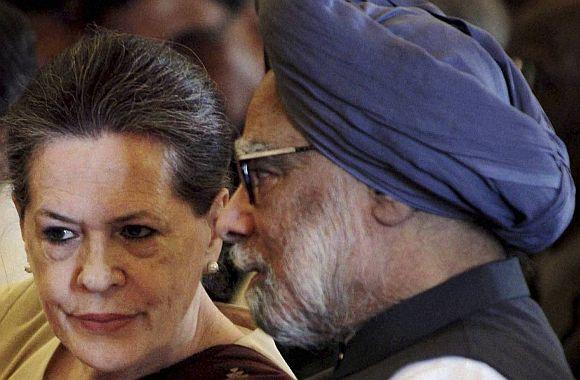
The Congress is fervently praying that the food bill and the cash transfer scheme will push into the background memories of lack of leadership, credibility and authority of the Manmohan Singh government in UPA-II that had fuelled anti-incumbency.
Starting from the UPA-II’s tenure in 2009 down to the current day, the government has been lurching from one crisis to another even before the earlier one has died down; it has been busying fighting its own demons within and outside the coalition as well trying to grapple with the opposition which has had a field day trying to put the ruling combine on the mat.
The magic of the Singh-Sonia-Rahul trimurti that had helped the Congress win 2009 is no longer there. The middle-classes which swore by Singh in UPA-1 appear to be disenchanted, with rising prices, slipping economic growth, growing fiscal and current account deficit and exposes ranging from Adarsh housing society to Commonwealth Games, 2G, coalgate and railgate taking a toll of the image of the prime minister and his government.
The coal allotment scam, being probed by the CBI, has virtually reached Singh’s doorstep. And the prime minister may not be able to sustain himself if the apex court expedites the case in the backdrop of Ashwini Kumar losing his ministerial berth for vetting the CBI’s probe report and the agency’s complaint that key coal allotment files have gone missing and the minutes regarding the decision on allotments were either not recorded or were too sketchy for comfort.
Singh, on his part, continues to maintain a sphinx-like silence to the disappointment of the middle-classes. For an economist who once gave the slogan that India is an idea whose time has come, he has also been not been able to lift the mood and graph of the economy which continues to perform below par for a variety of economic and political reasons.
The poor, on their part, have been severely hit by a rise in prices in general and of food and fuel prices in particular. The tag of a youth icon vested with Rahul was usurped by leaders like Samajwadi Party’s Akhilesh Singh who became the chief minister of Uttar Pradesh. But what compromised Rahul’s image as a youth icon was his failure to come out and empathise with the youngsters who were out on the streets to express their anger and anguish at the brutal rape of a 23-year-old paramedic in Delhi in December 2012.
Nine years into active politics and six months since his appointment as vice president, Rahul has spent more time trying to get familiar with the party organisation, its leaders and the country instead of emerging as a leader in his own right when the upcoming Lok Sabha polls is largely being perceived -- despite the Congress’s denial -- as a battle between him and BJP’s Narendra Modi, with other regional leaders like Janata Dal-United’s Nitish Kumar, SP’s Mulayam Singh Yadav, Biju Janata Dal’s Naveen Patnaik, Trinamool Congress’s Mamata Banerjee or All India Ann Dravida Munnetra Kazhagam’s J Jayalalithaa waiting to throw their hats in the ring specially after the polls.
In such a situation, Sonia remains the one central figure who has once again stepped out to try and change the political narrative for the Congress by pushing for the food security law. Aware of the disenchantment of the middle-classes which had voted for the party in 2009, she is once again trying to weave the aam andmi into the Congress lexicon by using the food security law to reach out to the poor, particularly in the rural hinterland so far untouched by the Modi mania.
It is perhaps for this reason that in the last few months she has convened a series of meetings. At the sanvad baithak (dialogue session) in Surajkund in November 2012 she directed the party and the government to pull up their socks and fulfill the promises made in the 2009 manifesto. There was a brainstorming session at Jaipur in January 2013 where Rahul was elevated as vice president. This month, at a meeting of Congress chief ministers, general secretaries and other senior leaders, she instructed them to expeditiously implement the food security law in “letter and spirit” so that “nobody sleeps hungry.”
...
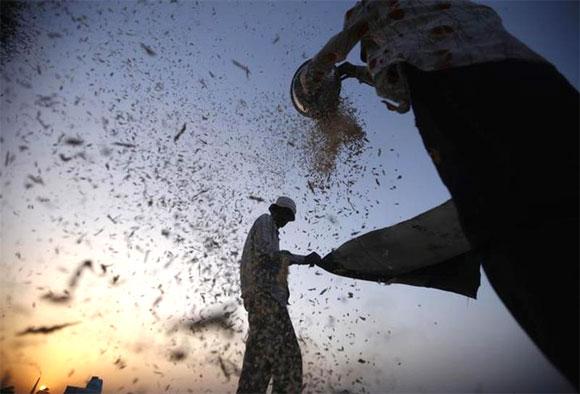
Aware that it will take at least six months for the benefits of food security to percolate to the people, the party is going all out to follow up on Sonia’s directive. As many as five (out of the 14) Congress-ruled states including Delhi, Haryana, Karnataka, Kerala, Haryana and Himachal Pradesh, assured her that they would start rolling out the scheme from August. Delhi and Haryana in fact were more precise; they would launch it formally on August 20 -- the birth anniversary of former prime minister Rajiv Gandhi -- with the benefits of it reaching the beneficiaries from September 2 in Delhi. The remaining states promised to implement it “soon” -- much before the six month deadline stipulated in the bill for rolling out the programme.
Congress spokespersons and other leaders have begun to fan out across the country to take the message to the people that UPA has lived up to its promise to bring food security. There are workshops for Pradesh Congress Committee members, press conferences in state capitals and training session for the party’s foot soldiers who are expected to inform the people of the party’s pro-poor initiative and distribute the relevant literature.
The intent behind the exercise is two fold: to flag and disseminate the message that people are legally entitled to subsidised foodgrains and to show up the opposition as recalcitrant and insensitive to the poor if it fails to approve the ordinance when it is brought to the House. There is also the unstated reason that there is no knowing how the court will react to a PIL that has been filed against the issuance of an ordinance.
Like any ordinance, the one on food security is valid for six months and needs to be ratified by Parliament within six weeks of the session taking place. In this case, the ordinance would need parliamentary ratification during the monsoon session expected in August.
The opposition has slammed the government for taking the ordinance route for a major programme like food security which touches the lives of two thirds of the population, with BJP president Rajnath Singh alleging that the Congress’s move is aimed at ensuring “vote security”.
Opposition leaders claim that they want the food bill but with certain amendments and a parliamentary debate. The Congress, which discounted speculation that the ordinance was linked to early Lok Sabha polls, however claims that it was forced to opt for an ordinance as the BJP has been stalling Parliament and was not keen on a special session for passing the food bill.
But the Congress can politically gain from the exercise only if the benefits of food security reach the people and leave an imprint on their minds and lives before the elections.
In its bid to get it off the ground, the party has not even thought through the four-fold challenge before it -- implementing the programme effectively by making foodgrains available, accessible and affordable; plugging the existing loopholes regarding storage and distribution of foodgrains through the PDS network; ensuring that opposition-ruled states, some of which were the first to start distributing subsidised foodgrains through their own schemes, do not usurp the central scheme as their own as they had done with the rural employment guarantee act until the Centre prefixed it with Mahatma Gandhi’s name; and finally invest in agricultural growth.
...
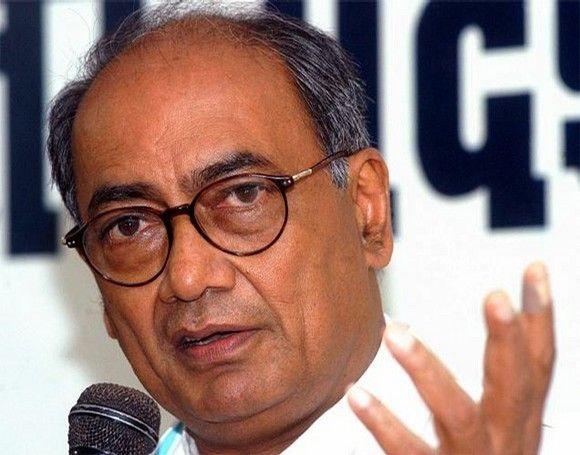
In this grim scenario, three developments give heart to the Congress notwithstanding the warnings about relying too much on them -- its recent electoral victories, Narendra Modi’s entry on the national stage and the change in response of its former constituents towards it.
The electoral victories in Karnataka, Himachal Pradesh and Uttarakhand and the installation of a Jharkhand Mukti Morcha-led government in Jharkhand has enthused Congress workers even though the party won in Karnataka because of the split of BJP votes after B S Yeddyurappa set up his own outfit and the success in Himachal had more to do with Virbhadra Singh’s charisma and stature than the party’s image. In Uttarakhand, the Congress won by one seat over the BJP. But for a party which was in despair until recently, these developments have given it some hope for the future.
Secondly and ironically, the party is banking not only on Sonia and Rahul to get them votes but also on Modi. Many in the Congress believe that Modi’s entry into the national stage is beginning to generate a secular-communal debate that will push the Muslims and the liberals in the majority community towards them.
Modi’s analogy of the Gujarat riots with a puppy run over by an errant driver or his comments of being a Hindu nationalist have raised the decibel level in the debate first ignited by BJP patriarch L K Advani’s boycott of the party’s Goa meeting where Modi was elevated as campaign committee chief against his objections as it would scuttle the BJP’s plans to build a National Democratic Alliance plus alliance and then by the JD-U’s decision to walk out of the NDA over Modi’s enhanced role at the Centre.
But there is an equally strong possibility that instead of congregating towards one party, the minorities -- which have in any case never voted for the BJP -- would get split between parties in different states. The Congress, for instance, will have to vie for this vote with the ruling SP and the Bahujan Samaj Party in UP, the JD-U, the Rashtriya Janata Dal and the Lok Janshakti Party in Bihar or the Trinamool Congress and the Left in West Bengal.
At the same time, a strong anti-Modi diatribe threatens to consolidate the BJP’s support among the majority community and perhaps also create faultlines within the Congress itself.
Take the case of Digvijaya Singh, former Madhya Pradesh chief minister who spearheads for the Congress anti-Modi, anti-BJP and anti-RSS tirade in order to polarise the voters along the secular-communal planks much like Modi’s confidante and UP in charge Amit Shah does by visiting Ayodhya and talking about building a Ram temple there soon. There are various interpretations on why Digvijaya has taken this up with a missionary zeal.
These range from speculation that he may be doing so to prevent the perception of a Rahul vs Modi battle specially when the Congress vice president has failed to articulate his views on key issues to attempts to keep the Congress in the reckoning and capturing for himself the anti-Modi space in the political discourse.
Be that as it may, his efforts sometimes threaten to boomerang on the party. After Raghavji sex scandal came into the open in Madhya Pradesh, Singh’s controversial tweet “Bacha, bacha Ram ka, Raghavji ke kaam ka” raised the hackles of his Congress’s deputy leader in the assembly Rakesh Singh Chaturvedi so much that he defected to the BJP ahead of the no-confidence vote against the Shivraj Singh Chouhan government.
He may have had his own reasons to switch sides but he used the tweet to do so.
Thirdly, the Congress’s allies may be unhappy with it but have little option at the moment but to carry along. If the BJP has lost a key ally in the JD-U, the Congress is hoping to shore up its flanks by getting back some of its erstwhile allies.
Karunanidhi’s DMK parted ways on the issue of Sri Lankan Tamils but turned to the Congress for support for a renewed Rajya Sabha term for his daughter Kanimozhi. Similarly, to give shape to its larger strategy of building alliances for 2014, the Congress decided to support Hemant Soren as chief minister under a deal that would allow it to contest 10 of the 14 Lok Sabha seats in Jharkhand and contest in alliance with the JMM in neighbouring Odisha, Bihar, Chhattisgarh and West Bengal.
Insofar as the SP and BSP are concerned, with the Damocles’ sword hanging over their heads over the cases relating to disproportionate assets neither Mulayam Singh Yadav nor Mayawati are in a position to rock the UPA boat at least till the Lok Sabha polls. Both know that the UPA has the numbers.
Indeed, Mulayam has conveyed to the prime minister that he will not withdraw support despite his criticism of the coalition and his reservations about the food bill being anti-farmer. But the attitude of the two UP-based parties would depend on who gets how many seats in the new Lok Sabha.
RJD’s Lalu Yadav is more concerned about the verdict in the fodder scam case though he got a temporary reprieve with the Supreme Court restraining the trial court from delivering its judgment in the case. But he is also closely monitoring the moves of the Congress and the JD-U, with the latter hailing Nitish Kumar as secular after he broke away from the NDA.
...
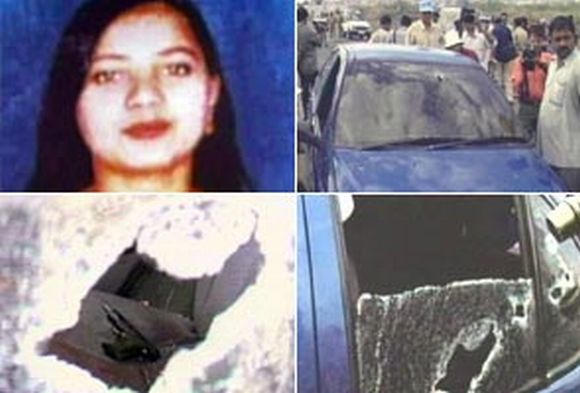
If the Congress is banking on the growth of the anti-Modi sentiment among parties and leaders in the non-BJP spectrum, perhaps the single most important factor that both parties hope to cash in on is the Ishrat Jahan fake encounter case.
Politics is being played out over a young dead woman, with the case becoming a political football for the two major national parties in their search for support among the minority and majority communities respectively, particularly in communally sensitive Uttar Pradesh and Bihar which together account for 120 of the 543 elective seats in the Lok Sabha and can influence the post-poll developments.
The BJP has been focusing on Jahan’s alleged terror links, thereby signaling that any sympathy for her would be misplaced. It is also trying to expose the Congress hand behind the Central Bureau of Investigation by highlighting the tip off given to the Gujarat police by IB director Rajendra Kumar that Jahan and three other LeT operatives were on their way to assassinate Modi and some other leaders.
As a counter to this, led by Digvijaya, the Congress is trying to send out the message that Modi is somehow linked to the case but in an effort to not hurt the not-so-secular Congress voters who brook no compromise on terror, he has skipped any reference to her alleged terror link.
There are many in the Congress who hope that the 2004 encounter case will somehow block Modi’s attempt to gain power at the Centre. The case could turn serious if the CBI files a charge-sheet accusing Modi of a hand in staging the fake encounter, with no one quite sure of the kind of political, social and electoral impact such a move will have.
But the institutional conflict between the CBI and the IB on the issue has tended to embarrass the Centre and give a handle to the BJP to accuse the Congress of putting national security on the backburner for the sake of votes.
With the issue getting politicised any movement on the Ishrat Jahan case is likely to change the contours of the campaign, eclipse the popular debate the Congress wants on food security and perhaps even influence the outcome of the polls in 2014.
...